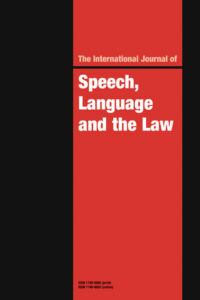
Eva Ng
International Journal of Speech, Language and the Law, 29(2), 172–200
Abstract: Previous studies into jury comprehension have focused on Anglo-American courts and highlighted concerns about lay English-speaking jurors’ ability to understand jury instructions. Such studies have pointed to the use of legalese as the major cause of the problem and overlooked the impact of the manner of delivery on jury comprehension. This study sets out to examine Chinese jurors’ ability to understand trials conducted in English, which they speak as a second or even a foreign language (L2), and to explore what L2 speakers of English find problematic for their comprehension of courtroom discourse. A random sample of local Chinese eligible for jury service (n=53) are recruited from the community to take part in a comprehension test of courtroom discourse using authentic audio recordings of two jury trials from the High Court of Hong Kong. Taking the Voice Projection Framework (Heffer 2018) as a point of reference, this study demonstrates that, while discursive voicing is to blame for the participants’ comprehension problem, as manifested by studies with native English-speaking jurors, in the case of L2-speaking jurors, the speakers’ physical voicing of courtroom discourse is found to be a significant factor in impeding jurors’ comprehension of the discourse. This article argues that making courtroom discourse accessible to L2 speaking jurors requires more than improving discursive voicing. Physical voicing matters as much, if not more.
About the author: Eva Ng is a HYI Visiting Scholar from 2022-23.
